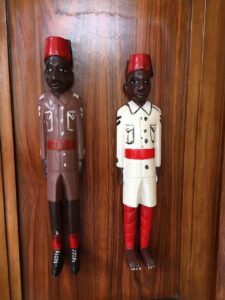 colo statuts in Ghanian pop culture
colo statuts in Ghanian pop culture
By Albert Olatunde Oloruntoba
Once again, my trip to Ghana was one that not only sort of validated what I knew from my readings of literary and non-literary texts, it also gave me access to new knowledge about slave trade, colonialism, and apartheid on the African continent. My ‘no-tour’ of the Elmina Castle alone was a whole lot of journey way back to many centuries – thank goodness I returned. This trip back in time really opened my world, the one I thought was already opened. So, the city of Accra is filled with art work and artifacts that I found fascinating. I couldn’t help but get some for my collection. Among the art works I saw were wood arts that are attached to the hotel where I was lodged with other scholars who went for the same project that took me there. These are woodwork of African men dressed in uniforms worn by community police under the colonial administrators depicts the interesting characterization of the local colonial police. I later gathered (thanks to Prof Oduro) that the art images of these have now been popularly called colo status This quickly drew my attention to Chinua Achebe’s and Wole Soyinka’s classics, Things Fall Apart (1958), Death and the King’s Horseman (1975) respectively. In both texts, there are scenes where local police offices and court messengers who are serving the administrators are used by the white man to further oppress other oppressed indigenes.
The colonial police who were fellow black men were used as tools of oppression and suppression by the colonial administrators. While some of these men seemed to enjoy their assumed power over people who were equally oppressed just as them, others were really not impressed with their job. Why am I even writing all these long stories! A rhetorical question that has an answer, hun. So, although not directly the same, my view of xenophobia in the beautiful country South Africa seem to fall within similar ideology, at least that’s what it seems to me. While most African nations are struggling because of the failures of their leaders, some citizens are struggling to recognize the source of their suffering. It is easier to blame the assumed less powerful rather than to confront the obviously gigantic power that oppresses you.
Research has shown that the migration (I am not even sure if this is the right word) of Africans within the continent supersedes that of migration to the West, yet the narrative misleadingly portrays the opposite. That is not even my focus here, my focus is the movement of Africans from Africa to another African country: South Africa, and the treatment of these migrant Africans in the country. Crime and illegality is condemned and the laws require that criminals be punished according to the law. Also, many African travellers to South Africa do not possess valid documents and so they become unaccountable for even if they are involved in any form of criminal act. What is worse also is when an immigrant in a nation does not have valid document yet goes on to intentionally commit crimes, this is difficult to understand. That being said, the anger towards “foreigners” either criminals or not is what I want to attempt to synonymise with the ideology behind what Ghanaians call colo status, these are images of local police under the colonial administrations in African countries. These police officers were used against their fellow oppressed citizens by the colonial administration when this administration itself was the oppressor. Likewise, I would say “foreigners” in SA have become the soft target of hate when apparently the larger problem is the higher form of mistreatment coming for the country’s political leadership.You know when someone superior to you gets you upset but you cannot confront them, you will immediately transfer the aggression to anyone close by who is not your superior. Because you can’t confront this “more powerful” person, your anger is passed on to whoever you are able to confront at that moment. The baton in the hands of colonial police used against fellow indigenes could be likened to the form of anger that some (and I have to highlight the word some) South Africans have towards “foreigners” who are often only as seen as African immigrants, when the actual problem suppressing them both is failed leadership in their nations.
If the colo police and court messenger understand beyond the advantage that they have as the chosen one by the oppressor, he would know that their common problem is their leadership, they will also invest more energy in demanding good service from these leaders. Also, if the “foreigners” understand that their host nation and nationals are dealing with some economic conditions invested upon them by their leadership – just as they have in their origin countries – they would behave legally in the country where they find themselves. Anger therefore is not the way towards demanding accountability and effectiveness from African leaders, we have to demand African leaders to solve economic problems and I am sure that when this happens, most problems relating to xenophobia would be solved.


